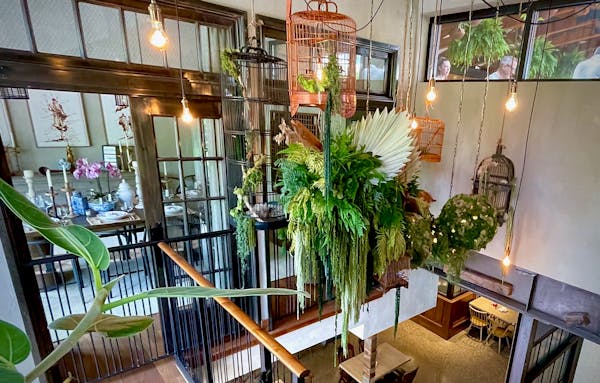Almost two years after it opened, the groundbreaking Indigenous restaurant Owamni is still booked up almost two months ahead. But with the opening of the Indigenous Food Lab, there's a way to enjoy a facsimile of Owamni's menu without a reservation.
Although Midtown Global Market's frenetic corridors are no replacement for the stunning views from Owamni's perch above the Mississippi River, diners can find the same North American ingredients featured in tasty grain bowls, tacos and salads at the Indigenous Food Lab (IFL).
It's a first-of-its-kind training center, market and kitchen devoted to Native foodways. Operated by North American Traditional Indigenous Food Systems (NĀTIFS), the nonprofit founded by chef Sean Sherman and Dana Thompson, IFL could serve as a model for similar ventures rooted in other Indigenous communities in North America.
"This is planting a seed for what is possible for Indigenous food access in the future: Our first market is just the beginning," Sherman said about the Indigenous Food Lab's opening.
Location: Midtown Global Market, 920 E. Lake St., Mpls., natifs.org/indigenous-food-lab. Serving hot food 10 a.m.-6 p.m. Tue.-Sat. Cold grab-and-go items and market wares are available on Mondays, as well.
The vibe: The Indigenous Food Lab is on the market's west side, and consists of a retail shop, grab-and-go fridges, a visible kitchen that spans the northwest corner of the market, and a clean, bright seating area that's been gussied up with planters of birch branches. This is just one vendor in a market full of flavors, from Tibetan momos and Venezuelan arepas to barbecue and couscous. Come for Indigenous Food Lab's careful handling of masa, bison and berries, and turn your visit into an international feast.
The food: Like its big sibling Owamni, Indigenous Food Lab refrains from using any ingredients brought to North America by colonizers. Those include flour, dairy, pork, chicken and white sugar. The compact menu, designed by kitchen assistant manager Ana Garcia Castellanos and NĀTIFS culinary program coordinator Nash McRoberts, instead offers three ways to experience a number of proteins that are native to this region: in tacos made with nixtamal tortillas ($12), on čhoǧíŋyapi — a sope-like open-faced corn sandwich ($13.50), or in an Indigenous grain bowl ($13.50). Proteins include bison birria, smoked whitefish, smoked turkey, three sisters (squash, corn and beans), and mushroom and leek. From there, choose one of four sauces to top it all off (the puréed yellow corn and sumac was a sweet and earthy favorite).
There's also a salad section ($10-$12) with additional protein toppers: pecan and mushroom dumplings or cold, thin-sliced bison. Chili was sold out when I visited, but is top of my list for next time.
A dessert selection ($1.50-$4) relies on maple for sweetness in a sunflower cookie and a pecan berry "cupcake" (it's more like a tart).
"The limitations in the ingredients we can use allows us to be creative, and to reimagine our traditional foods with innovation, communal wisdom and sustainability," Garcia Castellanos said.
The drinks: Hot or iced herbal teas, chaga or cacao are made to order ($3.50-$4.50), on a menu developed by Francesca Garcia. The grab-and-go fridge also carries canned beverages.
The market: Everything from Red Lake Nation wild rice and frozen bison to handcrafted earrings and soaps made from native plants is available in the minimalist market surrounding Indigenous Food Lab's ordering kiosk. "We're so proud of the network we've created with Indigenous vendors from around North America," said market manager Jason Garcia. "The market will give each of our partners a real opportunity to reach consumers, and in the process, educate about Indigenous products and their uses."

The 5 best things our food writers ate this week

A Minnesota field guide to snow shovels: Which one's best?

Summer Camp Guide: Find your best ones here

Lowertown St. Paul losing another restaurant as Dark Horse announces closing

